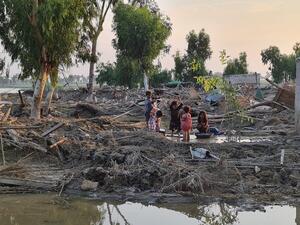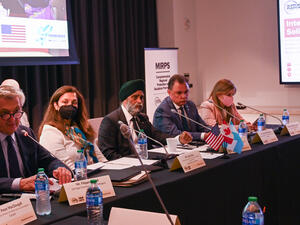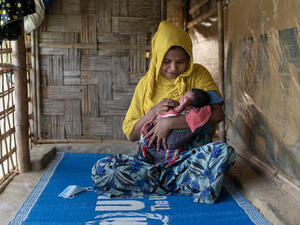UNHCR receives record pledge of $358m; welcomes new donors
UNHCR receives record pledge of $358m; welcomes new donors

Carpentry training for Sudanese refugees in Kenya's Kakuma camp will prove helpful if they eventually return to Sudan in one of UNHCR's planned supplementary programmes in 2004.
GENEVA, Dec 8 (UNHCR) - The UN refugee agency today received a record initial pledge of $358 million for its 2004 budget from more than 30 countries, expanding its donor base to include newcomers from Eastern Europe and the Persian Gulf.
This amount, which represents nearly 36 percent of UNHCR's $1-billion budget for next year's programmes, includes $324 million in pledges made during the agency's annual pledging conference in Geneva today, and $34 million announced earlier.
"This is a good start and it shows that our efforts to widen our donor base and increase the predictability of our funding are starting to bear fruit," said Anne Willem Bijleveld, UNHCR's Director of Communications and Information, the unit overseeing donor relations. "In particular, we are pleased to welcome some East European countries who will soon join the European Union, as well as countries from the Gulf region, as newcomers to UNHCR's pledging conference".
In all, 33 countries announced their pledges this year, five more than last year. Newcomers to the event include Cyprus, Hungary, Kuwait, Qatar and Slovakia. Other main contributors include Belgium, Denmark, the Netherlands, Norway, Sweden, Switzerland, the United Kingdom and the United States. Prior to the conference, the European Commission had already announced a contribution, while Estonia, Germany, Hungary and Slovenia had made pledges.
The record initial figure pledged at today's conference - surpassing last year's early pledges of $317 million - gives UNHCR a good head start for 2004 and makes it easier for the agency to predict its plans and work for the next year.
However, Bijleveld warned, donors must make consistent efforts to help UNHCR reach its overall funding target next year, adding that the agency was far from "out of the woods."
Pointing to the $100-million funding shortfall for the current year, High Commissioner Ruud Lubbers told donors at the conference that UNHCR still has to be "prepared for a situation where the annual budget is not fully funded." The High Commissioner has already implemented a series of reductions during the year to bring expenditures into line with income.
The 2004 budget presented at today's conference includes $954.9 million under the annual regular budget and more than $57 million in supplementary programmes for the situations in Liberia and Sudan.
Additional supplementary appeals could be launched next year as needs arise. These could range from programmes to support refugee return and assistance programmes for displaced people in Iraq, to possible repatriation in a number of African countries.
Among other issues discussed at the conference, many donors supported the High Commissioner's call for UNHCR to receive a bigger share of the UN's Regular Budget. Of UNHCR's $954.9 million annual budget, only 2.5 percent comes from the regular UN budget. The rest is financed by voluntary contributions to UNHCR from donor states and, on a smaller scale, from private contributions.
Several donor representatives commended the High Commissioner's innovative efforts to broaden the agency's donor base, noting that it has been much too narrow in the past when fewer than 10 governments accounted for the vast majority of UNHCR's funds.
Other concerns raised included the fact that a small number of mainly developing countries are hosting the bulk of the world's refugees, as well as the increasingly hostile environment in which humanitarians must work today.
Referring to the attack on the UN's Baghdad headquarters in August and the recent killing of a UNHCR staff member in Afghanistan, many paid tribute to those who work in some of the most remote, difficult and dangerous places in the world.
By region, UNHCR's 2004 budget includes $331 million for Africa; $157.6 million for Central and South-west Asia, North Africa and the Middle East; $101.5 million for Europe; $47.6 million for Asia and the Pacific; and $24.8 million for the Americas.







